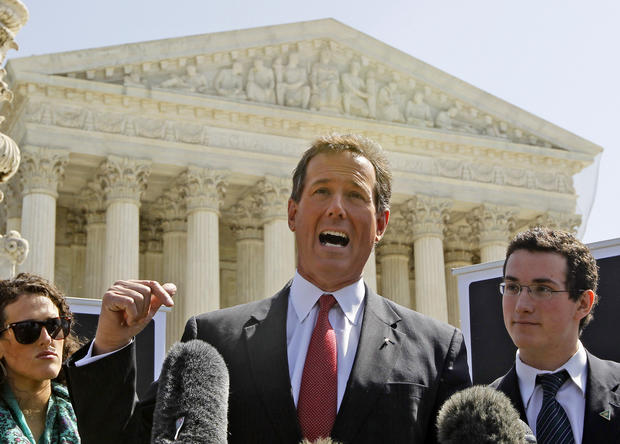Santorum's willingness to fight to the end comes with risks
Almost no one expected Rick Santorum to get this far.
After all, the former Pennsylvania senator spent the first six months of his bid for the Republican presidential nomination as an under-funded, under-organized, and under-polling sideshow, someone who was discounted privately by his Republican rivals and the media alike.
But with 11 states now in the win column, Santorum has made Mitt Romney scrap for nearly all of his victories and surely has caused more than a few sleepless nights at the front-runner's campaign headquarters in Boston.
Nonetheless, Romney has amassed a substantial lead in the delegate count as April nears, a month that offers several opportunities for him to take a major step toward becoming the nominee. And conservatives who had long been skeptical of him are beginning call more loudly for the party to unite around the former Massachusetts governor.
This dynamic is an unpleasant one for Santorum, not only because of its implications for 2012 but because it raises an important long-term question for him: Is he risking his future in the party by continuing to run an aggressive campaign against the likely nominee?
South Carolina Sen. Jim DeMint threatened to open the floodgates against Santorum last week when he heaped praise on Romney and said that his remaining GOP opponents should assess whether they can still win.
"If they can't, the best thing they can probably do is to help the one who is going to win," DeMint said.
On Sunday, Mississippi Gov. Haley Barbour -- who, like DeMint, has not endorsed Romney -- upped the ante by suggesting that the front-runner would become the nominee "unless he steps on a landmine."
The inevitability argument is one that Santorum argues is hollow, insisting that he can still win the 1,144 delegates required to seal the nomination on the first ballot. "We have just as good a chance of getting to [the delegate threshold] as he does," he told the National Review.
But Santorum is finding fewer prominent Republicans who defend that view.
While many political observers have circled April 24 as the date on which a Santorum loss in his home state would leave him little choice but to step aside, a more immediate day of reckoning could come next Tuesday when Wisconsin, Maryland, and Washington, D.C., hold their primaries.
Santorum has little chance of victory in the latter two contests, and has recently downplayed his chances of winning in Wisconsin; an 0-for-3 showing that day will surely increase the calls for him to step aside, or at the very least to tone down the rhetoric against Romney.
Former Iowa Republican Party Chairman Steve Grubbs, who helmed Herman Cain's campaign in the nation's first voting state, said that Santorum's future in the GOP will be enhanced if he goes into the convention as a vital player but warned that he must be careful to avoid perceptions that he is "hanging on for his own ego."
"I think it's important that it does not appear that he's making it personal," Grubbs said. "At the convention, he has to show a unified front. That's pretty difficult if it draws to a bitter end, so being more positive and issue-oriented will improve his stature."
Neutral Republicans are concerned that Santorum is diminishing Romney's chances of beating President Obama in the fall, a concern that has grown given Santorum's combative posture after winning Saturday's Louisiana primary.
In Wisconsin the next day, Santorum called Romney "the worst Republican in the country to put up against Barack Obama." And during an appearance Monday on the steps of the Supreme Court, he said the Republican front-runner was "uniquely disqualified to make the case" against Obama's health care reform law.
"Sen. Santorum's presence in the race isn't as big of a problem for the party as his tactics," said one officially unaligned Republican strategist. "He has long since stopped consistently offering a positive vision and instead focused on the most childish and counter-productive attacks possible on the likely nominee. I get running hard to the finish line, but people aren't going to forget the manner in which he did it."
Whenever Santorum has been asked about his ambitions beyond 2012, he has insisted that his entire focus is on winning this time around.
But unlike 68-year-old Newt Gingrich, Santorum is expected to remain in the thick of the fray in the coming years. Only 53, the former senator has proven his tenacity as a campaigner and earned a strong following within the conservative movement.
Despite his refusal to acknowledge the steep odds posed by the delegate math, Santorum has become increasingly open about at least one fallback plan.
Asked in an interview Monday with David Brody if he would consider being Romney's running mate, Santorum responded that he would "of course" do so.
The only problem: Romney has publicly downplayed the prospect of tapping Santorum for VP, and the deep Republican bench further underscores the unlikelihood of such a move.
But with more than 250 delegates to his name already and a solid claim to the title of chief Romney alternative in the 2012 primary fight, Santorum still wields plenty of clout.


